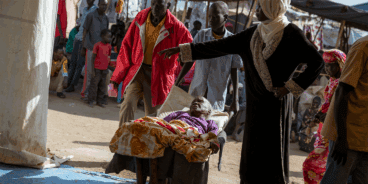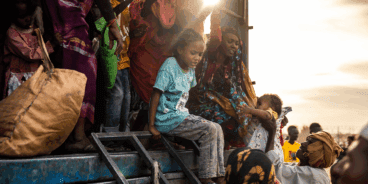
Bashir Arrested, Sudan at the Crossroads
Today, 11 April, President Omar al-Bashir of Sudan was removed from power and arrested by the Sudanese army following four months of mass protests. Bashir, who has ruled Sudan since a 1989 military coup, is also wanted by the International Criminal Court (ICC) for genocide, war crimes and crimes against humanity.
Sudan is now at a crossroads. The removal of Bashir is an important victory for the hundreds of thousands of protesters who have taken to the streets since 19 December. Today should mark the beginning of a historic transition from military rule and lead to an inclusive dialogue regarding the deep social cleavages and political grievances of the people of Sudan. While Sudan’s Minister of Defense, Awad Mohamed Ahmed Ibn Auf, has announced that the military will oversee a two-year transition of power, at the time of publication it is unclear whether the demonstrators will accept this plan or demand power be handed to a civilian government.
The overthrow and arrest of President Bashir also provides an opportunity to reflect upon the atrocity crimes perpetrated in Sudan during his three decades in power. Following a referral by the UN Security Council in 2005, Bashir and other government officials – including the head of the ruling National Congress Party, Ahmed Haroun, who was also arrested today – were indicted by the ICC for crimes perpetrated in Darfur following a military campaign that was launched in 2003. Government forces allegedly killed thousands of civilians, burned villages and forcibly transferred hundreds of thousands of people, and raped thousands of women. The documented evidence of these atrocities is both shocking and comprehensive.
The ICC’s Pre-Trial Chamber found that Bashir played a crucial role during the Darfur campaign and determined that there were reasonable grounds to believe that he acted with specific intent to destroy the Fur, Masalit and Zaghawa ethnic groups. The new de facto leader of Sudan, Awad Mohamed Ahmed Ibn Auf, also allegedly coordinated operations of the Janjaweed, who were responsible for atrocities in Darfur. The UN has reported that since 2011 government forces and allied militias have also perpetrated potential war crimes and crimes against humanity against civilians in the disputed provinces of South Kordofan and Blue Nile.
Following the dramatic events of the last week, Sudan’s security forces should defend the universal right to freedom of assembly, association and expression. In particular, the army must uphold its responsibility to protect all Sudanese civilians and end the use of disproportionate and deadly force against protestors. Bashir and Haroun should be transferred to The Hague to stand trial before the ICC.
The decisions and actions taken now by the army and the Sudanese people will have far-reaching consequences for the future of their country. The people of Sudan – particularly those who have been victims of war crimes, crimes against humanity and genocide under Bashir’s leadership – deserve justice, peace and stability. This can only be achieved through a credible political transition that respects people’s desire for democratic reform and does not simply put another dictator or perpetrator of atrocities in power.
Related Publications


